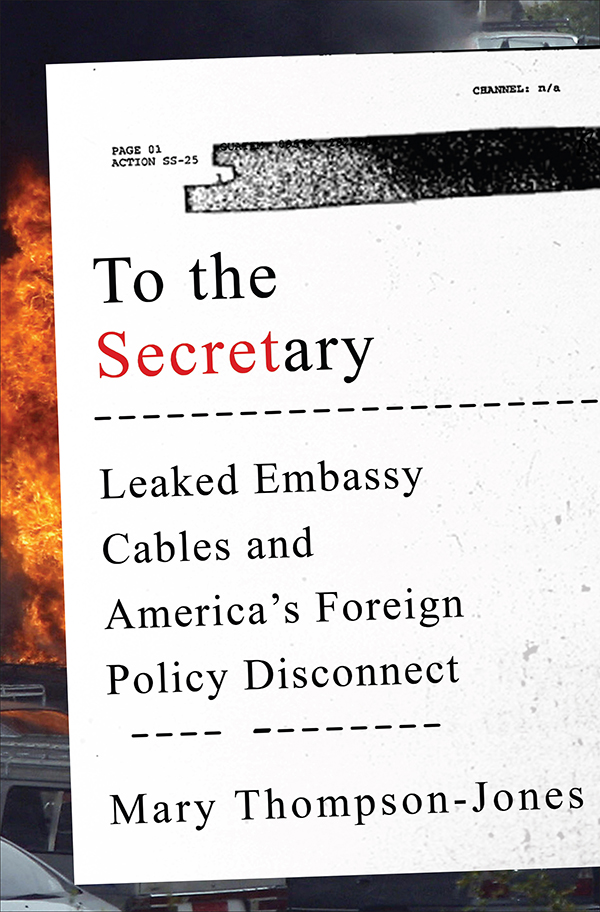
To the Secretary
Leaked Embassy Cables and America's Foreign Policy Disconnect
کتاب های مرتبط
- اطلاعات
- نقد و بررسی
- دیدگاه کاربران
نقد و بررسی

April 25, 2016
In this well-written and informative effort, former diplomat Thompson-Jones provides context to the State Department cables released by WikiLeaks in 2010. Writing from the “calmer vantage point” of five years later, she reveals what the leaked cables “did and didn’t do to the world of diplomacy.” As she explains, what’s most significant about the information leak is that it happened “in real time,” as opposed to the decades-long process by which secret government documents are typically declassified. For readers interested in the behind-the-scenes role of embassy workers and diplomats, this is an especially informative story, and Thompson-Jones tells it through colorful glimpses of life overseas. A recurring theme is the divide, during the George W. Bush administration, between the pragmatism of diplomats stationed abroad and the “more ideological and ambitious agenda” of Washington policy makers. Her sometimes withering assessments of the Obama administration’s performance and former Secretary of State Hillary Clinton’s presidential suitability add much to the book’s topicality but little to its account of diplomacy. In general, though, this well-organized and readable book amply succeeds in fulfilling one of Thompson-Jones’s main objectives —to use the words and stories of Foreign Service officers to “demystify their work.”

May 15, 2016
A career diplomat uses embassy cables to describe the complex lives of foreign service officers.When WikiLeaks published 251,287 cables in 2010, the massive leak of confidential information polarized the American public. But Thompson-Jones (Director, Global Studies and International Relations/Northeastern Univ.) is an academic and veteran diplomat, and her viewpoint is positive: the exposed cables describe daily life in U.S. embassies around the world. The author argues that the American people know very little about their ambassadors and fail to appreciate their delicate work. "When onetime presidential candidate Ross Perot famously said that diplomats could be replaced by fax machines," she writes, "he ignored the real art in delivering a message that offers an opportunity for a conversation. Diplomats listen for a reaction. In many cultures a diplomat has to know when yes means no, or maybe, or we'll see." Thompson-Jones dedicates much of her book to major themes, such as "travel" and "frenemies," and she boils down entire countries to one quality or another: Bulgaria, to Thompson-Jones, represents "corruption," and she describes the nation through its web of organized crime. Most of her quotes derive from cables, which are heavy with perspective and nuance. The most dramatic chapter focuses on Iraq, an assignment that most diplomats resented, but the book is dense with provocative anecdotes from around the globe--e.g., one diplomat in China was shocked to find a bevy of abused tigers, alarming Washington, D.C., with his lurid descriptions. Not surprisingly, Thompson-Jones writes about sticky situations in a diplomatic way. "The transition from George W. Bush to Barack Obama brought with it a long-needed lift in America's world standing," she writes carefully. The author dedicates a final chapter to Hillary Clinton, thoughtfully assessing her tenure as secretary of state. Amid the current heated election cycle, Thompson-Jones provides some sharp insights into Clinton's performance. A breezy, informative profile on foreign service that serves as an inviting primer for prospective diplomats and their admirers.
COPYRIGHT(2016) Kirkus Reviews, ALL RIGHTS RESERVED.

May 15, 2016
In 2010, WikiLeaks blew the lid off American diplomacy with Cablegate, its release of over 250,000 leaked embassy cables, at the time the largest such exposure of classified information. Former diplomat Thompson-Jones (global studies, Northeastern Univ.) here revisits the events and offers insight into the struggles of on-the-ground diplomats who did their job in the face of budget cuts, waning American influence owing to the Iraq War, and policy contradictions emulating from Washington. Thompson-Jones tells the story from a macroperspective in a narrative that doesn't get bogged down with heavy detail. Diplomatic work that receives the author's highest praise often involves the personal touch that goes beyond meeting with leaders in capital cities. Because the leaked cables cover two presidencies (the years 2006-10), the book provides contrasts between the George W. Bush and Barack Obama administrations. This volume complements other works such as William A. Rugh's Front Line Public Diplomacy and Geoffrey Wiseman's Isolate or Engage. VERDICT Highly recommended for students of diplomacy and those seeking knowledge about recent American foreign policy. [See Prepub Alert, 1/11/16.]--Jacob Sherman, John Peace Lib., Univ. of Texas at San Antonio
Copyright 2016 Library Journal, LLC Used with permission.

























دیدگاه کاربران